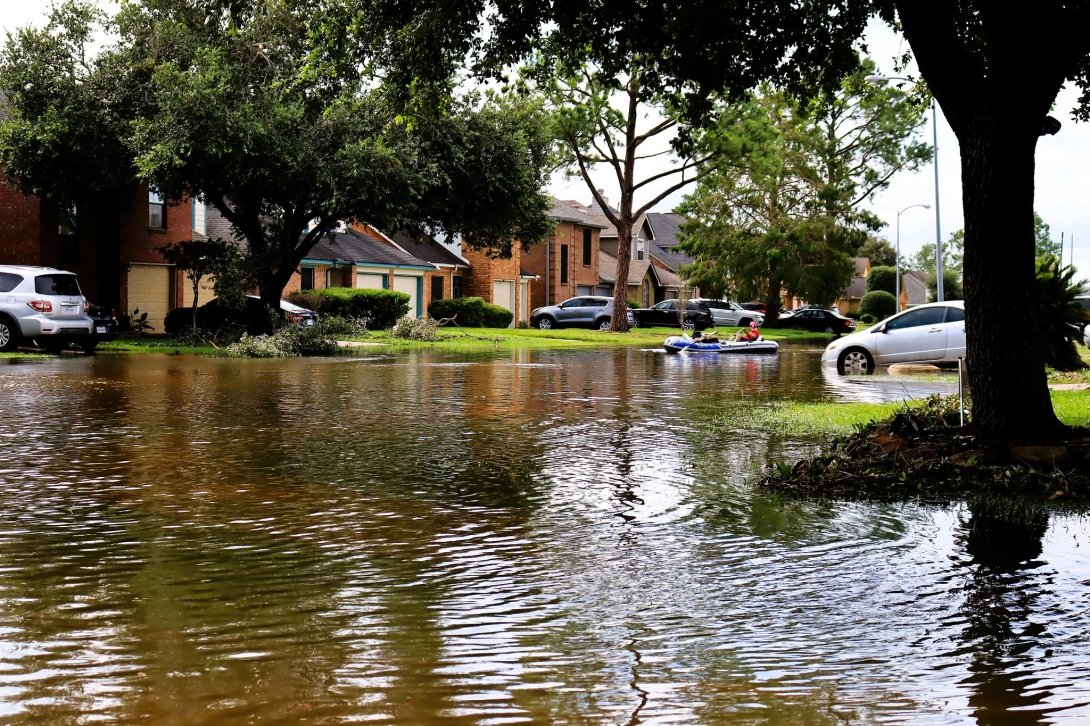Social Media's Untapped Potential in the Climate-Change Fight

The aftermath of Hurricane Beryl in a Houston neighborhood
Flickr user 2C2K Photography
Climate change is reshaping our world, yet people are unlikely to encounter much news about it when scrolling through their social-media feeds. This is particularly concerning given that the majority of Americans — particularly Black and Hispanic/Latino adults — now get their news at least sometimes from social media.
Misinformation about climate change runs rampant on social media
Climate-change misinformation is pervasive and strategically disseminated through social-media and native advertising, significantly influencing public perception and discouraging policymakers from taking action. Research shows that exposure to credible climate information on social-media platforms can increase awareness and efficacy — the belief that individuals can do something to mitigate the problem. However, there is a noticeable lack of accurate climate-change information reaching people through these channels.
A 2023 survey conducted by Oxford University asked respondents how they accessed news and information about climate change over the course of a specific week. Even though about half of Americans surveyed encountered climate-change news that week, only 18 percent of them came across such news on social-media platforms. While the First Amendment might limit government intervention in promoting specific types of news, platform users, advocates and scholars have the right to call on social-media providers to take a more proactive role in spreading trustworthy information. These companies have the power to make climate change impossible to ignore — but they need to use it.
Climate change should not be treated like just any other news topic. A nonpartisan study the Federal Communications Commission published examined the essential information local communities need to ensure their well-being. Based on the study’s criteria, it’s clear that news about climate change qualifies as essential: It’s needed to ensure safety, health, access to opportunities, and active participation in civic and democratic activities.
Social-media platforms’ role as distributors places them as important actors in the media environment. These platforms have not only a duty to avoid harming the public good but also an opportunity to actively support it. Discussions around media regulation and media policy have focused predominantly on restrictive measures — specifically, what content to remove or limit. However, we need to talk about and highlight the need for an affirmative approach as well: Platforms must actively promote credible climate-change news for the sake of the public interest.
Collaborative efforts for greater impact
The importance of social media in climate-change communication is well-studied. However, the digital age presents challenges that could hinder the spread of this vital information. Online, attention is scarce amid an overwhelming deluge of information, and newsrooms often produce news with an eye to what will perform well on social media. In doing so, they often prioritize audience preferences over journalistic standards, leading to a tendency to publish softer, more digestible topics at the expense of complex issues like climate change.
There are some encouraging signs within newsrooms. For instance, over the last few years, major news outlets such as CNN, Financial Times and The Washington Post have launched climate-specific Instagram accounts.
While commendable, these efforts face limitations. Such niche accounts have significantly fewer followers than those newsrooms’ primary accounts. They may be further restricted by platform algorithms, which rely primarily on engagement and interaction measures, pushing these accounts even further outside of users’ sight. Now that mainstream news outlets are making efforts, it is time for social-media platforms to step up, adjust their algorithms and amplify these newsrooms’ attempts.
Moving forward: What can social-media platforms do?
By promoting climate-change news, social-media platforms can leverage their vast reach to increase public awareness and engagement. These platforms are viable and attractive tools for such a purpose. News outlets can adapt content for social-media consumption and the distracted audience online, making complex topics such as climate change more accessible and appealing. For instance, they can employ a positive and subjective tone, as positively charged posts tend to be shared faster than neutral or negative ones.
Now is the moment to take the conversations around platform policies and governance to the next step by exploring how social-media platforms can rewrite their algorithms to boost visibility for credible climate-change news from reputable sources. There are valuable lessons to learn and areas for improvement, particularly for platforms that have historically hindered the reach of accurate information.
According to a 2020 Avaaz report, health misinformation on Facebook was viewed four times as often as accurate information from government agencies. Moreover, a Markup study revealed that Facebook users from ethnic groups in the United States encountered less credible COVID-19 content than their white counterparts. Platforms can and must address these disparities to ensure the equitable dissemination of reliable information.
To be more specific, platforms can perform topic amplification. Similar to how platforms handle trending topics, they could create mechanisms to amplify credible climate-change news, ensuring it reaches a broader audience. And they can partner with news outlets to ensure a steady stream of accurate, engaging climate-change content by upranking authoritative and credible information while downranking misleading information. Platforms and newsrooms can work together and implement educational prompts, notifying users about significant climate events or new research.
The science is clear: Our window to mitigate catastrophic climate change is rapidly closing, demanding immediate, decisive action from individuals, industries and governments worldwide. Even as we push Big Tech to combat anti-democratic discourse online, we must push for interventions that prioritize and amplify accurate climate-change news. We know these companies have the ability to modify their algorithms: In March 2024, for example, Instagram users discovered they had been automatically enrolled in a new setting that reduces political content. Now platforms need to use this capacity for good to boost critical environmental information.
Help Free Press continue to combat misinformation: Donate today.